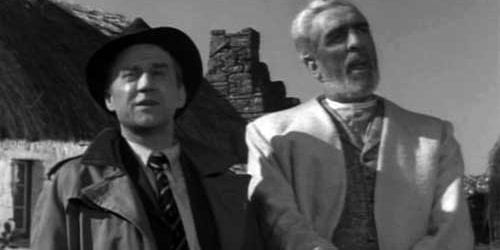
Newly available from Warner Archive is a rarely seen John Ford project shot in Ireland. Made directly after The Searchers, the movie was intended by its production company to promote Irish filmmaking. Perhaps it did, although the notes at TCM’s website quote a 1958 Variety report claiming that D.P. Quish of Limerick County Council called it “a vile production and a travesty of the Irish people”. That’s the kind of sensitivity unleashed when there’s no homegrown industry allowing people to trash themselves. While no major accomplishment, it’s a warm, ambiguously cozy “fillum” that wears well in the memory.
The Rising of the Moon is an anthology of three stories enacted by players of the Abbey Theatre Company and taken from Irish authors. This makes their cast of comic stereotypes (everyone is vaguely larcenous, prone to the bottle, or hypocritically upright) at least authentic more than Hollywood burlesque. The only imported Yank is Tyrone Power, who does nothing but stand handsomely in a doorway and introduce the tales with dashes of gentle blarney.
Which are, if you please: Frank O’Connor’s ruefully comic “The Majesty of the Law”, in which the police inspector (Cyril Cusack) enacts a circumspect, apologetic show of arrest for assault against a down-at-heels yet fiercely proud local (Noel Purcell), with even the injured party doing his best to prevent it; Martin J. McHugh’s “A Minute’s Wait,” a shaggy-dog anecdote of a train’s prolonged whistle stop with dozens of broadly played characters; and the title 1907 play by Lady Gregory (one of the Abbey’s founders) as updated to the Black and Tan War of 1921, about the genial conspiracy to free an Irish rebel (Donal Donnelly) scheduled to hang, and the song that, as one policeman (Denis O’Dea) notes, makes rebels of us all.
In keeping with Ford films, this movie presents an entire world of characters played by old pro’s (speaking so Oirishly that subtitles would have been nice). These communities of daft complicity present a vision of the world that functions efficiently if sideways to observe certain social and structural forms (i.e. justice, transportation) while subverting them. Miguel Marías’ online review at www.fipresci.org seems oddly distracted by Ford’s use of tilted angles in the third segment but makes nice observations otherwise, especially in describing the second segment as an expansion of the opening anecdote in Ford’s The Quiet Man.. He calls it “the ultimate expression of Ford’s notorious penchant for digression,” while even Power introduces the first segment as “a story about nothing”. Throughout the film, a cultural opposition to England is demonstrated in several ways, from the treatment of the bourgeois English couple on the train to the representatives of law and order; Marías reports the film was forbidden in Northern Ireland.

![Call for Papers: All Things Reconsidered [MUSIC] May-August 2024](https://www.popmatters.com/wp-content/uploads/2024/04/all-things-reconsidered-call-music-may-2024-720x380.jpg)



